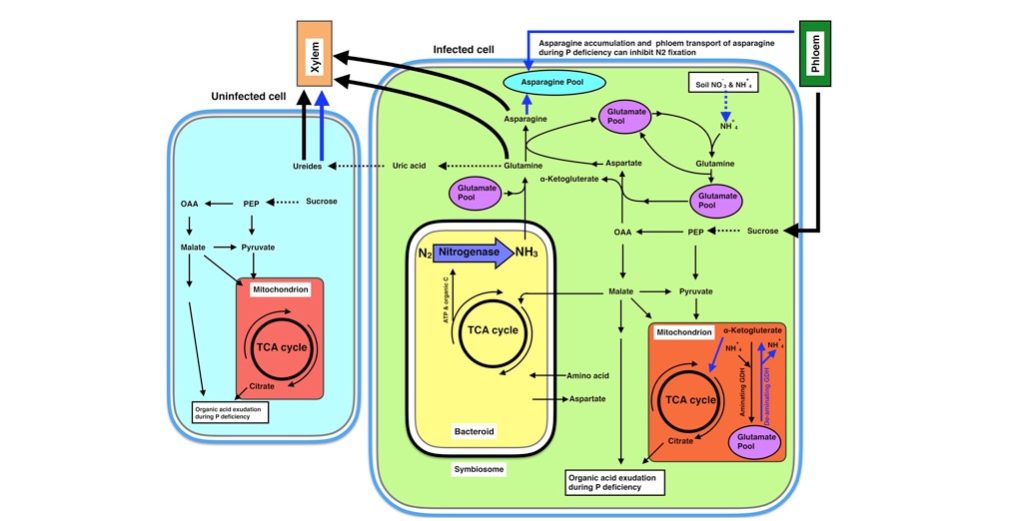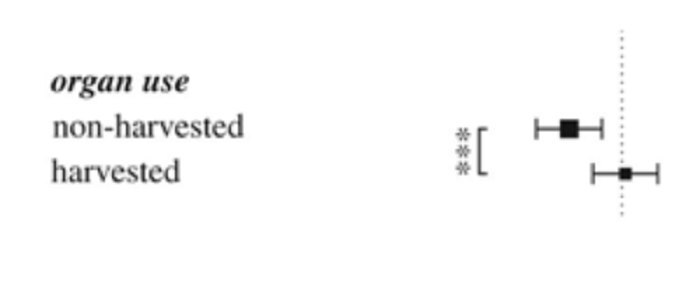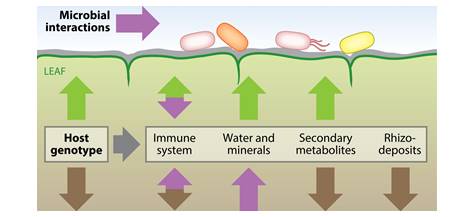
Review: Adaptive strategies for N metabolism in P deficient legume nodules ($)
Plant Science Research Weekly, Research0 Comments
/
Legume nodules fix N, but their function has a high requirement for P, making nitrogen-fixation highly sensitive to P deficiency. Valentine et al. review how P limitation affects nodule function and also how nodules respond and adapt to P deficiency, drawing largely on studies of Virgilia divaricata,…

Review: Transport and homeostasis of K & P ($)
Plant Science Research Weekly, ResearchNitrogen (N), phosphorus (P), and potassium (K) are the three macronutrients required in highest amounts for plant growth. N is abundant in the atmosphere, therefore plentiful if we overlook the energetic costs of converting N2 to usable form. By contrast, K and P are present in limited amounts in the…

Review: Nitrogen sensing in legumes ($)
Plant Science Research Weekly, ResearchAs a consequence of their ability to fix nitrogen in symbiosis with bacteria, legumes make key contributions to ecosystems and provide protein-rich foods for humans and other animals. Recent years have uncovered the nature of the signals involved in the cross-kingdom dialogues that occur between plant…

Domestication impacts on plant–herbivore interactions: a meta-analysis
Plant Science Research Weekly, ResearchIt is widely stated that domestication has contributed to a decrease in plant resistance to herbivory, but to what extent is this true? In a contribution to a special issue on “Human influences on evolution”, Whitehead et al. describe results of their meta-analysis. Although their data show a consistent…

Calcium Deficiency Triggers Phloem Remobilization of Cadmium
Plant Science Research Weekly, ResearchCadmium (Cd) is among the most toxic heavy metal to humans. Contamination of Cd in soils poses a serious threat to both crop productivity and human health in many parts of the world. Understanding the molecular mechanisms of Cd transport process will help in developing plants for soil remediation and…

Iron acquisition and saline-alkaline tolerance in rice
Plant Science Research Weekly, ResearchSoil saline-alkalization is a major abiotic stress to agriculture worldwide, causing considerable damage to crop growth and loss of crop productivity. In alkaline soil, iron availability to plants also becomes very limiting. This paper explores the physiological and molecular mechanisms of rice plant’s…

Photosynthetic machinery protection induced by UV-B in Chlamydomonas
Plant Science Research Weekly, ResearchLight is good, too much light is bad. Photosynthetic organisms can dissipate excess light through a variety of means including non-photochemical quenching. Czechowski et al. show that in Chlamydomonas perception of UV-B light via the nuclear/cytosolic receptor UVR8 induces accumulation of proteins that…

Reviews: Seed dormancy and germination ($)
Plant Science Research Weekly, ResearchA pair of reviews in J. Exp. Bot. covers aspects of seed dormancy and germination. Steinbrecher and Leubner-Metzger (10.1093/jxb/erw428) provide an excellent introduction to materials science including stress-strain curves and Young’s Modulus, which they then apply to an understanding of the biophysics…

Review: The Plant Microbiota: Systems-Level Insights and Perspectives ($)
Plant Science Research Weekly, ResearchTerrestrial plants are hosts to diverse types of microbes, predominantly bacteria, that affect plant health and growth in numerous ways. The major types of plant microbiota include plant pathogens, arbuscular mycorrhizal (AM) fungi, endophytes (residing within plant tissues), epiphytes (residing on plant…

